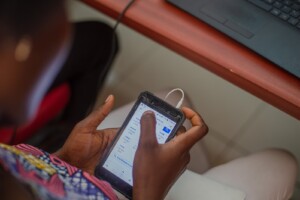Sudan Press Council files complaint against TV channel for covering protests
The prosecution department of the government-controlled Press and Publications Council filed a complaint against Al Arabiya office in Sudan and its correspondent in Khartoum under article 66 of the Criminal Code, concerning the publication of false news, which carries a penalty of six months’ imprisonment or a fine or both.
 Journalists on strike in Khartoum on 27 December 2018
Journalists on strike in Khartoum on 27 December 2018
The prosecution department of the government-controlled Press and Publications Council filed a complaint against Al Arabiya office in Sudan and its correspondent in Khartoum under article 66 of the Criminal Code, concerning the publication of false news, which carries a penalty of six months’ imprisonment or a fine or both.
The security authorities summoned Saadeldin Hassan, correspondent of Al Arabiya, a Saudi-owned pan-Arab TV news channel, to question him about the coverage of the protests.
The ruling regime in Sudan under President Omar Al Bashir has “continued to tighten its grip on newspapers and journalists” in the wake of public protests and uprisings that have dominated the news for the last three weeks.
In a statement on Monday, the Sudanese Journalists’ Network decried “the continued punitive measures and reprisals against the press and journalists calling on Al Bashir step down.”
“A number of journalists have been brutally assaulted and insulted by officers of the National Intelligence and Security Service (NISS) for no reason other than carrying out their professional duty to cover peaceful protests. They were detained and released after hours.”
Journalists targeted
The statement said: “The attacks have been systematic and clearly targeted the journalists, while the authorities must issue clear and binding directives to the forces to facilitate their tasks and enable them to access the scene of the event”.
Press curbs
The National Intelligence and Security Service (NISS) has launched a frantic campaign against the press and imposed a strict prior-publication censorship, monitoring the content of daily newspapers and mainly focusing on El Tayyar and El Jareeda. It has, among others, prevented the two dailies from covering the protests by turning the printing presses into barracks for the security service or military, and the entire print-run of El Jareeda has been repeatedly confiscated.
On December 27, Sudanese journalists embarked on a three-day strike in response to peaceful demonstrations and protests across the country, protesting the authorities’ continued crackdown on press freedom and expression, and the arrest of a number of journalists.
Reporters Without Borders
International press freedom watchdog Reporters Without Borders has issued a statement voicing its alarm at “a new crackdown on the Sudanese media, which has included arrests, attacks on journalists, publication bans and internet cuts. The crackdown has been prompted by a nine-day-old wave of anti-government protests that were triggered by food and fuel price hikes”.











 and then
and then